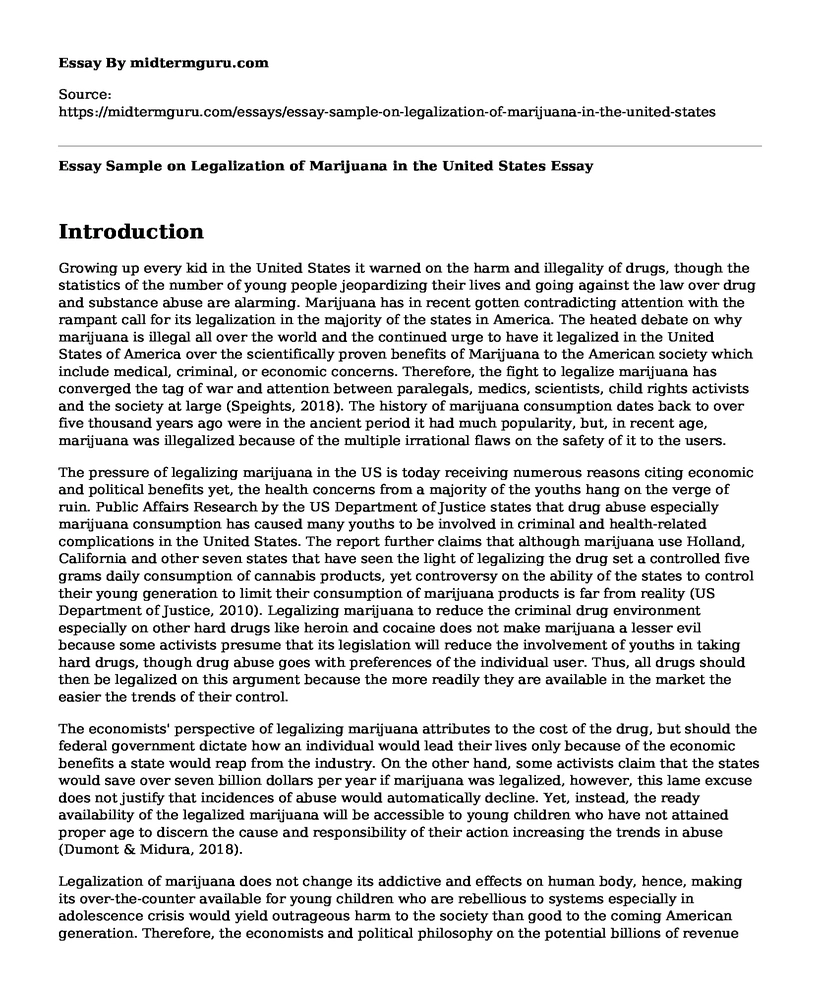Introduction
Growing up every kid in the United States it warned on the harm and illegality of drugs, though the statistics of the number of young people jeopardizing their lives and going against the law over drug and substance abuse are alarming. Marijuana has in recent gotten contradicting attention with the rampant call for its legalization in the majority of the states in America. The heated debate on why marijuana is illegal all over the world and the continued urge to have it legalized in the United States of America over the scientifically proven benefits of Marijuana to the American society which include medical, criminal, or economic concerns. Therefore, the fight to legalize marijuana has converged the tag of war and attention between paralegals, medics, scientists, child rights activists and the society at large (Speights, 2018). The history of marijuana consumption dates back to over five thousand years ago were in the ancient period it had much popularity, but, in recent age, marijuana was illegalized because of the multiple irrational flaws on the safety of it to the users.
The pressure of legalizing marijuana in the US is today receiving numerous reasons citing economic and political benefits yet, the health concerns from a majority of the youths hang on the verge of ruin. Public Affairs Research by the US Department of Justice states that drug abuse especially marijuana consumption has caused many youths to be involved in criminal and health-related complications in the United States. The report further claims that although marijuana use Holland, California and other seven states that have seen the light of legalizing the drug set a controlled five grams daily consumption of cannabis products, yet controversy on the ability of the states to control their young generation to limit their consumption of marijuana products is far from reality (US Department of Justice, 2010). Legalizing marijuana to reduce the criminal drug environment especially on other hard drugs like heroin and cocaine does not make marijuana a lesser evil because some activists presume that its legislation will reduce the involvement of youths in taking hard drugs, though drug abuse goes with preferences of the individual user. Thus, all drugs should then be legalized on this argument because the more readily they are available in the market the easier the trends of their control.
The economists' perspective of legalizing marijuana attributes to the cost of the drug, but should the federal government dictate how an individual would lead their lives only because of the economic benefits a state would reap from the industry. On the other hand, some activists claim that the states would save over seven billion dollars per year if marijuana was legalized, however, this lame excuse does not justify that incidences of abuse would automatically decline. Yet, instead, the ready availability of the legalized marijuana will be accessible to young children who have not attained proper age to discern the cause and responsibility of their action increasing the trends in abuse (Dumont & Midura, 2018).
Legalization of marijuana does not change its addictive and effects on human body, hence, making its over-the-counter available for young children who are rebellious to systems especially in adolescence crisis would yield outrageous harm to the society than good to the coming American generation. Therefore, the economists and political philosophy on the potential billions of revenue that would be tapped from the marijuana industry would cause more harm to the children's future than the limited benefits this heavy taxes would fetch. Making a critical observation of why illegal drugs industries have a history of the huge flow of monies is because of the essence of keeping the legal justice at bay with the dealers, but, legalizing such drugs like marijuana would change some of those logistics that drug dealers have to undergo to remain safe in the business. Thus, the economists and political scientists perspective of the potential of untapped economic potential on legalizing marijuana is just but an illusion because skipping such systems would reduce the market value of the drug.
Conclusion
In conclusion, consideration of marijuana legalization in the United States of America promises more harm than good to the society especially to teenagers and other young adults. The only thing that marijuana legalization would benefit the states is safeguarding the dealers from tedious logistics systems to remain in business without getting on the wrong side of the law. However, the multiple disadvantages in the social and health damage will remain with us in the society placing the consumer to lose more than the trade in the efforts to legalize marijuana.
References
US Department of Justice, (September 2010). Crime in the United States 2009. U.S. Federal Government. 16 January 2011 <www2.fbi.gov/ucr/cius2009/data/table_69.html>.
Dumont, Tyler & Midura, Kyle (January 4, 2018), Vermont House passes a bill to legalize pot, Burlington, Vermont: WCAX-TV.
Speights, Keith. (Sep 23, 2018). Timeline for Marijuana Legalization in the United States: How the Dominoes Are Falling. What you need to know about the past, present, and future of marijuana legalization nationwide, The Motley Fool. Available at https://www.fool.com/investing/2018/09/23/timeline-for-marijuana-legalization-in-the-united.aspx
Cite this page
Essay Sample on Legalization of Marijuana in the United States. (2022, Sep 19). Retrieved from https://midtermguru.com/essays/essay-sample-on-legalization-of-marijuana-in-the-united-states
If you are the original author of this essay and no longer wish to have it published on the midtermguru.com website, please click below to request its removal:
- Discuss a Popular or Literary Representation of Your Country Case Study
- Analysis of the Article on the Drug Abuse - Paper Example
- Essay Sample on Homecoming at School
- Paper Example on Women Rights
- Essay Sample on Teenage Pregnancy in Rural Areas
- Racism in Schools: Growing Prejudice & Discrimination - Essay Sample
- China's Film Media in the Digital Age: A Research on Mass Communication Dynamics - Essay Sample







